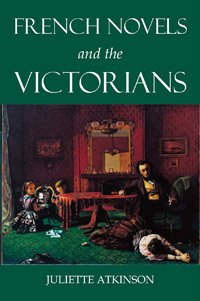
The print version of this article can be downloaded as a PDF file.
Dr Juliette Atkinson is Lecturer in English at University College London. She was a British Academy Postdoctoral Fellow 2009–2012.
In March 1844, Elizabeth Barrett wrote to her friend Mary Russell Mitford:
‘I meant to send you Zizine & I have sent instead Moustache, as representative of Paul de Kock. And now it has come into my mind, that there is a good deal of offensive matter in this Moustache, & that after you have read it, you will do well to throw it into the fire.’ [note 1]
In Charlotte Yonge’s novel The Young Step-Mother (1857), Albinia Kendal tends to her husband’s three difficult children. She is appalled to see her stepson Gilbert smuggle beneath his pillow a translation of Les Trois Mousquetaires (1844), ‘one of the worst and most fascinating of Dumas’ romances’. Gilbert, pleading to hear what happens to d’Artagnan before the book is snatched away, asks Albinia if she knows what it is about. She answers:
‘Yes, I do. My brother got it by some mistake among some French books. He read some of the droll unobjectionable parts to my sister and me, but the rest was so bad, that he threw it into the fire.’ [note 2]
The same year, the Saturday Review shared its misgivings:
‘When the teaching contained in the light literature of France, during the last thirty or forty years, is looked at by itself – apart, that is, from the “thrilling interest” of the plot – we feel amazed at the forbearance we displayed in not throwing the novels of a Sand or a Sue into the fire.’ [note 3]
A final incident. In 1860, 23-year-old Algernon Charles Swinburne went to stay with the Trevelyans at Wallington Hall. One day, his biographer relates,
‘Sir Walter Trevelyan came into the drawing-room and found a French novel lying on the table. He asked how it got there, and was told that Algernon had brought it as a gift. It was nothing worse, I believe, than a volume of the Comédie humaine, but he was a rash man who in those days recommended a French book to an English lady. Even if she made no objection, her male relations were sure to take umbrage. Sir Walter Trevelyan threw the book on the fire with a very rough remark, and Swinburne marched with great dignity out of the house.’ [note 4]
Such stories might lead one to wonder whether any French novels escaped conflagration in Victorian England, but each one involves more than the mere censure of improper literature. Barrett – who memorably described French novels as ‘immortal improprieties’ – jokingly presents book-burning as a theatrical act of cleansing that does not impede the enjoyment of cheeky novels [note 5]. Paul de Kock’s indelicacies are sufficiently substantial for her to worry about shocking Mitford, but negligible enough to have slipped her mind; she has read the ‘offensive matter’ herself, and expects her friend to. The incineration of Les Trois Mousquetaires is equally problematic. Beyond the feeble excuse that Dumas’s novel had slipped into a batch of books by ‘mistake’ (and what are these unnamed French books?), Albinia’s brother would have had to read a good deal of the novel in order to identify the ‘unobjectionable parts’. The auto-da-fé again smacks of performance, a cautionary tale being acted out for two impressionable sisters. Like Yonge, the Saturday Review raises the possibility of separating the excitement of French plots from their moral dangers, and the ‘thrilling’ nature of the novels somewhat lessens the hardship involved in the reader’s ‘forbearance’. The critic implies that the novels the public (including himself) had been placidly consuming for almost half a century had lulled them into forgetting that they were dangerous. The wake-up call did not come from amongst their ranks but, as he goes on to explain, from the French critic Eugène Poitou, who in vividly painting the horrors of French novels had brought to the Victorian public’s attention the perils they had narrowly escaped. The critic compares the resulting discomfort to that of ‘a man who discovers that he has been feeding for years at his favourite restaurant, not on ordinary healthy viands, but on cats, rats, and toads, ugly and venomous’. What was more upsetting: to discover that one had been eating rat, or that one had enjoyed it? As for the fate meeting Swinburne’s gift of a Balzac novel (an anecdote that has been repeated in different forms), the husband’s outburst appears to have as much to do with control over his wife’s reading habits and a reaction to the connotations surrounding French novels in general than with the book itself. It seems highly unlikely that this would have been the first encounter that Lady Paulina Trevelyan, friend of the Pre-Raphaelites and Brownings, would have had with French fiction. Gosse’s account is, furthermore, laced with condescension regarding the moral preoccupations of his forebears: to him, Balzac is of course harmless and the husband’s overreaction a specimen of antiquated Victorianism.

1. Elizabeth Barrett to Mary Russell Mitford, [13] March 1844.
2. [Charlotte Yonge], ‘The Young Step-Mother. Chapter VII’, in The Monthly Packet of Evening Readings for Younger Members of the English Church, 13 (January 1857).
3. ‘French Literature’, Saturday Review, 4:92 (1 August 1857).
4. Edmund Gosse, The Life of Algernon Charles Swinburne (London: Macmillan, 1917), 71–72.
5. Elizabeth Barrett Browning to John Kenyon, 1 May [1848].
6 ‘Balzac’, London Review, 5:115 (13 September 1862).